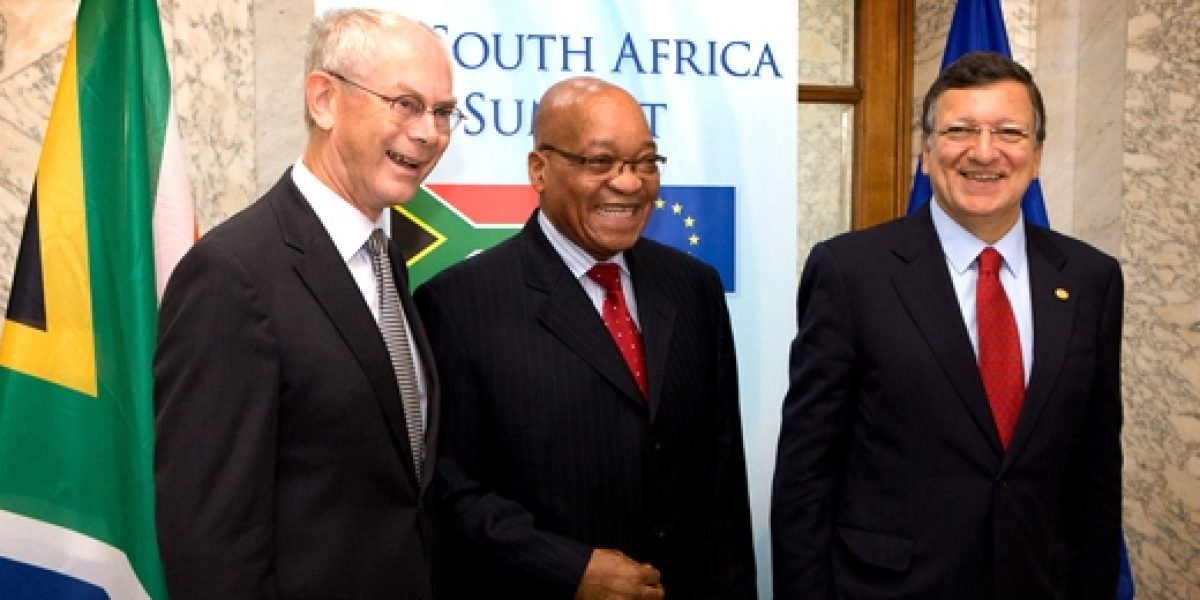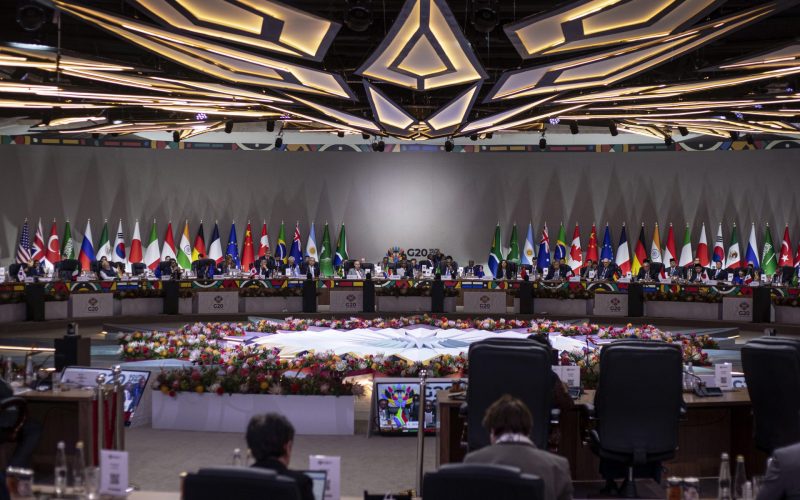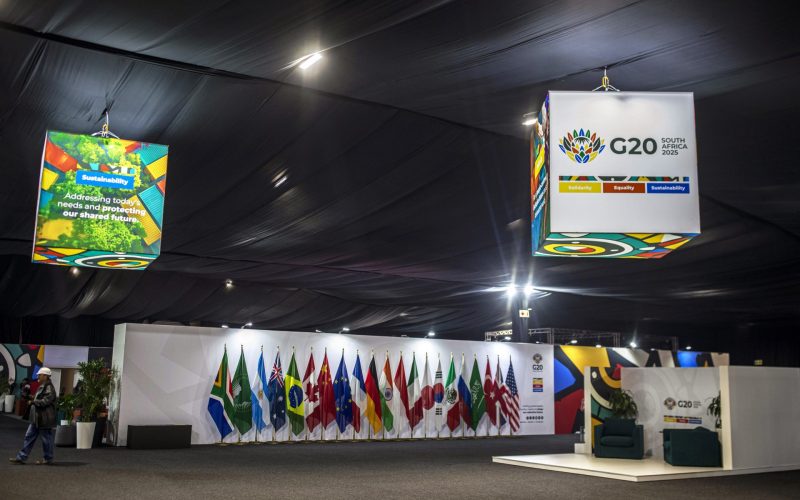The strategic partnership is built on two strands: enhanced political dialogue and cooperation on regional, African and global affairs; and stronger cooperation in economic and social sectors.
While enhanced political dialogue is the cornerstone for cooperation, including shared values such as democracy, human rights, peace and security, the partnership has also been consolidated over the past 13 years along economic lines. Trade between South Africa and the EU amounted to 39 billion euros in 2010, with more than 50% of the country’s exports to the EU being processed and semi-processed goods. Moreover, South Africa is the EU’s 13th largest trading partner, reflecting that South Africa accounts for a third of Sub-Saharan Africa’s Gross Domestic Product (GDP). It also explains in part why SA is the only country in Sub-Saharan Africa whose relations with the EU are at the level of a strategic partnership, although the EU has also identified Nigeria as a possible strategic partner.
Within the umbrella framework of the Mogobagoba Dialogue, which includes the Joint Cooperation Council, Ministerial Troika meetings and regular summits, a high level EU-delegation under the leadership Herman van Rompuy and José Manuel Barroso will visit South Africa this week for the 6th SA-EU Summit on Thursday, 18 July 2013.
The multilevel discussions have a strong domestic emphasis and will focus on mutually beneficial economic growth, investment and the continuation of EU development assistance, which amounts in the current EU financial framework (2007-13) to €980 million, with an additional €900 million from the European Investment Bank. But South African policy-makers should use the summit to push for EU policy-adaptation in the interests of South Africa’s African agenda.
What the two partners want from each other
The summit theme: ‘Job Creation Through Inward Investment’ is apt and captures the urgency with which both South Africa and the EU would like to deal with some of their economic difficulties, especially around job creation. For South Africa, the summit provides an opportunity for the country to re-assert itself as a safe investment destination, notwithstanding the tensions that have beset various sectors of the economy, including mining and agriculture.
However, the decision by the South African government not to renew the Bilateral Investment Treaties (BITs) with Spain, Luxembourg and Belgium last year, will no doubt feature in the discussions. South Africa has indicated that it would like to table investment legislation, which would provide it with the policy space that it feels is being restricted by individual BITs. The EU on the other hand sees the non-renewal of the BITs as an emerging protectionism on South Africa’s part.
There is expected to be broad convergence on what needs to be done to promote job creation, economic growth, investment and skills. The 2012 summit created various platforms, including the EU-SA business forum, while the EU-South Africa Forum on Human Rights had its inaugural meeting in May 2013.
The partnership could certainly be more ambitious on how the two entities should bridge the gap on Africa’s challenges, including trade, democracy, peace and security on the continent. Both partners need each other in order to advance their respective agendas in these domains. To construct a shared agenda, South Africa and the European Union should revisit the motivations that undergirded the strategic partnership in 2007. When South Africa and the EU upgraded their partnership to a strategic level, the EU was a confident supranational institution and policy entrepreneur, consolidating a stronger role in diverse areas including trade and security.
However, the global economic crisis has left the EU policy direction fractured and its normative power eroded. The EU’s external multilateral trading vision and its aid policies are increasingly under stress. These weaknesses have opened gaps in the EU’s outward external political role and leave little wiggle-room for policy-entrepreneurship. On the other hand, South Africa’s influence has grown steadily, with its inclusion in the BRICS in 2010 and having served as a non-permanent member of the United Nations Security Council on two occasions in quick succession – in 2007-08 and in 2011-12. The country has also assumed leadership roles in multilateral institutions, including as Chair of the African Union Commission and various agencies of the United Nations.
Toward EU-SA policy symmetry in Africa
South Africa is small in global terms, but too important in Africa to be ignored. Therefore, the basis of the strategic partnership for the European Union was less about economics, but arguably more about geopolitical considerations. As an anchor state on the continent, and one that shares values with the EU, South Africa is considered by other democracies as a constructive change-agent in Africa. South Africa’s diplomacy has embraced this role and its interactions with the EU should validate its leadership by pushing for policy-adaptation in Brussels in order to reflect the changing political geography and needs of the continent.
While South Africa has been uncompromising on the inconclusive Economic Partnership Agreements (EPA), the country should seek more policy adaptation in the security and aid infrastructure of the EU. The EU recognises South Africa’s strategic role on the continent, and there is convergence on the role that South Africa has played in mediating the two regional crises of Zimbabwe and Madagascar.
South Africa’s mediation in Zimbabwe under President Jacob Zuma has been crucial in changing policy perspectives in the EU and the resumption of dialogue with the Government of National Unity. This suggests that South Africa can play an important role as a trusted interlocutor in peace and security in Africa. However, South Africa and AU member states do not have enough resources to fund peace operations on the continent. While the EU committed 740 million euros since 2004 under its Africa Peace Facility for peace support operations in Africa, less than half of that amount has been utilised due to funding mechanisms that are unnecessarily complex and inaccessible because of restrictive criteria. Second, the EU’s aid mechanism with regard to ‘middle-income countries’ has been less than beneficial to South Africa and other similar economies on the continent because it does not take into account the domestic wealth distributional structures and challenges in these economies.
South Africa has a pre-eminent role in African affairs and a successful model of cooperation with the European Union should translate into tangible benefits for the rest of Sub-Saharan Africa. Although the aid relationship will be maintained, the issue of the EU funding middle-income countries will continue to be part of the debate in Europe, especially in light of the economic crisis.
However, the relationship with the EU (including areas of development cooperation) can evolve further beyond aid. South Africa can extract value from this summit by arguing for better funding mechanisms for peace and security operations on the continent, including a more Africa-driven dialogue on human rights and democracy.
Further reading:
Opinion pieces:
Forging a partnership with the EU beyond shared history (2012)
Do South Africa and the European Union need each other? (2012)
South Africa – European Union Trade: Age-old Chestnuts and Dealmakers (2011)
Research Papers:
South African Trade Policy and the Future Global Trading Environment (2012)
The Implications of the Lisbon Treaty for the EU’s Relations with Africa (2010)
South African Journal of International Affairs:
The EU and Africa since the Lisbon summit of 2007: Continental drift or widening cracks? by Damien Helly (2013). Please note that you will be diverted to the Taylor and Francis website where this journal article is available for download.








